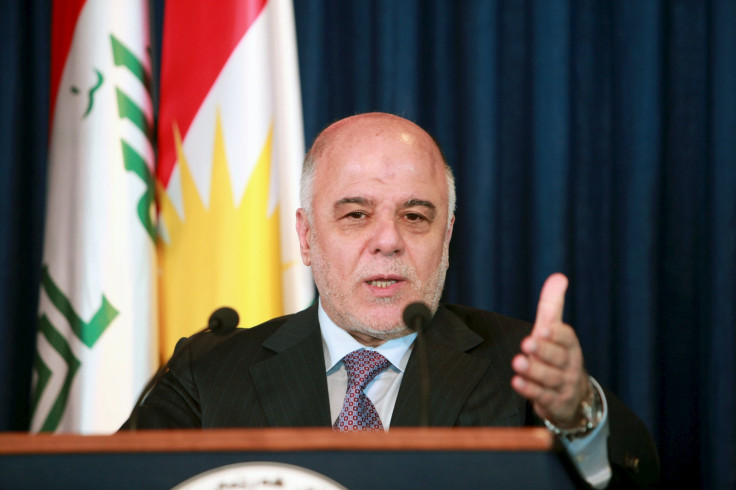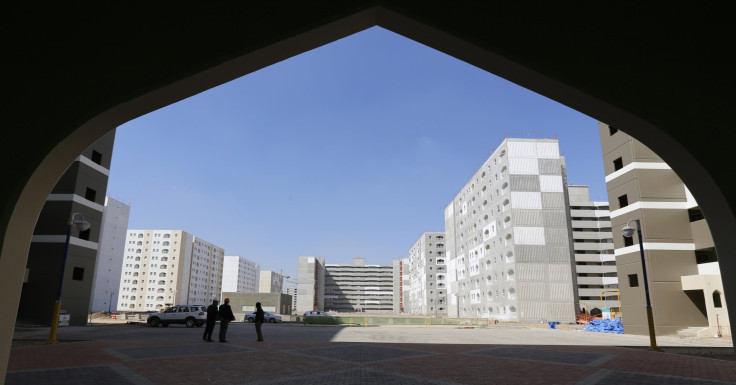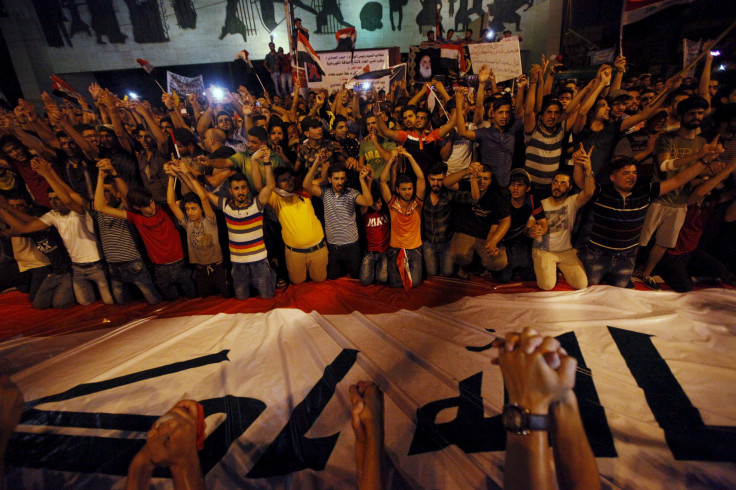Corruption and Cronyism: Iraqi Prime Minister Faces Uphill Struggle With New Reforms

Just a few miles south of Baghdad, a line of imposing concrete buildings rises out of the sandy landscape. These luxury apartment blocks are part of a new multibillion-dollar project that will eventually become a city to rival the Iraqi capital. The project, Bismayah New City, will house about half a million people in the next four years, dwarfing any other construction project in the country’s history.
The project is the perfect receptacle for corrupt dealings, analysts say, because it has attracted billions of dollars in investment without checks to ensure the funding is channeled into construction. Spearheaded by the National Investment Commission, the Iraqi government organization responsible for encouraging foreign investment, the project has so far raised around $2 billion, with an estimated total cost of $5.8 billion. South Korea's Hanwha Engineering & Construction has signed an $8 billion contract to build the city and aims to hand over the first apartments to Iraqis within a few weeks.
Despite the economic potential of the new city, critics fear the project will go down the same route as other failed construction projects, attracting corrupt politicians and employees who siphon off millions of the invested money without helping the building process.
“There is direct corruption when it comes to expensing these projects,” said Luay al-Khatteeb, a foreign policy fellow at the Brookings Institute, a think tank in Doha. “These are corrupt multibillion-dollar projects where everything from the salaries to employees involve corruption.”

This is exactly the kind of scenario Iraqi Prime Minister Haider Abadi wants to abolish with his corruption-reform policies introduced earlier this month. Under the new laws, Abadi hopes to slash superfluous government jobs, cut the number of military personnel and create a more balanced power-sharing structure in central government.
Abadi's Uphill Struggle
But Abadi faces an uphill struggle to get through the many layers of corruption entrenched in Iraqi society. Saddam Hussein's two-decade-long regime, buoyed by its oil wealth, thrived on a system of cronyism and control. Abadi is trying to move away from that reputation, encouraging trade and development -- but the Iraqi economy remains a major obstacle. Iraq's $102.5 billion budget now runs a deficit of about $21.4 billion, and despite international effort to help the country get back on its feet after two wars, many citizens still do not have access to electricity because of dysfunctional power plants.
Abadi wants to streamline government and boost an economy that has suffered for decades -- the wars physically ravaged Iraq, and the fighting opened up a power vacuum that allowed politicians to capitalize financially on the country’s vulnerability and lack of governance. But Judith Yaphe, an expert on Iraq and a professor at George Washington University’s Elliot School, argues that corruption is so ingrained in Iraqi culture that it will be almost impossible for the prime minister to make meaningful changes.
“The government has been ineffectual for years,” Yaphe said, adding that under Saddam and Maliki the corruption levels grew worse, especially with the rising sectarian tensions. “People expect a normal amount of corruption, but this was flagrant and abusive.”
Yaphe said after the Iraq War the international community donated billions of dollars to help Iraq restructure, but much of that money was never used for the rebuilding effort.

“We are talking a huge amount of money,” Yaphe said. “Where did it go? It disappeared.”
Hyperinflation hasn't helped -- under Saddam Hussein one Iraqi dinar was worth three dollars. But the economy began to suffer under economic sanctions after the 1991 Gulf War. By the time of the U.S.-led invasion in 2003, 3,000 dinars equaled one dollar. Now, 1,166 dinars equal about one dollar, according to the World Bank.
“The whole Iraq budget and government inflated during and after Saddam without anyone paying any attention to the performance of these jobs,” Khatteeb said, referring to the former Iraqi dictator. “Abadi really needs to take a significant action on addressing various issues such as how enterprises are doing business. ”
Oilslick On The Economy
Abadi may be keen to diversify, but Iraq's economy is still dominated by its oil sector, from which the government receives almost 90 percent of its revenue. In January Iraq’s parliament passed a budget of $105 billion, which constituted a 16 percent cut in spending, according to a report by The Economist. The budget also attempts to raise revenue, by introducing a sales tax on mobile and Internet top-up cards, airline tickets, vehicles, alcohol and cigarettes. Despite these maneuvers, the budget still projects a deficit of 25 trillion Iraqi dinars. That deficit could be much more given that the initial budget was estimated on a $56 per barrel price of oil. Prices have dropped significantly since then and now sit just below $42 per barrel.
The oil sector is also taking a hit because of corruption. Consumers living in areas dominated, or even loosely controlled, by the Islamic State group are having to pay almost double the normal amount for a gallon of gas (usually sold by merchants on the side of the road in rural areas) because the Sunni militant group has siphoned off millions of barrels of oil from the national grid.
The prime minister, meanwhile, under pressure from Shiite cleric Grand Ayatollah Ali al-Sistani, who earlier this month called on all Iraqis to protest government corruption, has begun implementing his reform package. Last week, Abadi fired Mohammed Khalaf Ahmed, the secretary-general of his cabinet, a close ally of former Prime Minister Nouri al-Maliki. This week he cut his cabinet by a third and dissolved four ministries, including human rights and women's affairs. Other officials on the chopping block include three figures who have dominated Iraqi politics since the U.S. toppled Saddam Hussein’s regime, including Maliki, a Shiite; Ayad Allawi, a Shiite from a Sunni-dominated bloc; and Osama al-Nujaifi, a prominent Sunni Arab leader.
“The formation of this government raised hopes among Iraqis, and we have to be the expectations of our people,” said Abadi in a tweet last week. “We are committed to the spirit of the Constitution and the law.”
Although experts say the biggest concern for Iraq is the brazen money-grabbing by politicians, ground-level corruption is also a concern.
“Corruption is everywhere,” Khatteeb said. Iraqis who are arrested often pay off the police, construction workers barter for salaries higher than their skill level, and even military personnel try to cheat the system to earn more money. Last year Abadi revealed the existence of 50,000 fictitious names on the military rolls, indicating efforts by the U.S. to help rid the security forces of financial corruption during the Iraq War failed. Iraq uncovered 50,000 "ghost soldiers" on the military payroll. The “ghost soldiers” referred to nonexistent individuals who were getting paid by the government but someone else was collecting their paycheck.
Because corruption is endemic to Iraq, analysts say Abadi will likely face a major backlash from those who stand to lose out under the new policies.
"I think on the whole the moves are popular," Yaphe said. "But he still needs to get rid of the three vice president positions, and that could worry the Sunni political parties. Who he appoints next is going to be important. He needs to target the individuals that nobody in Iraq trusts. He needs to actually carry this through."
© Copyright IBTimes 2024. All rights reserved.











